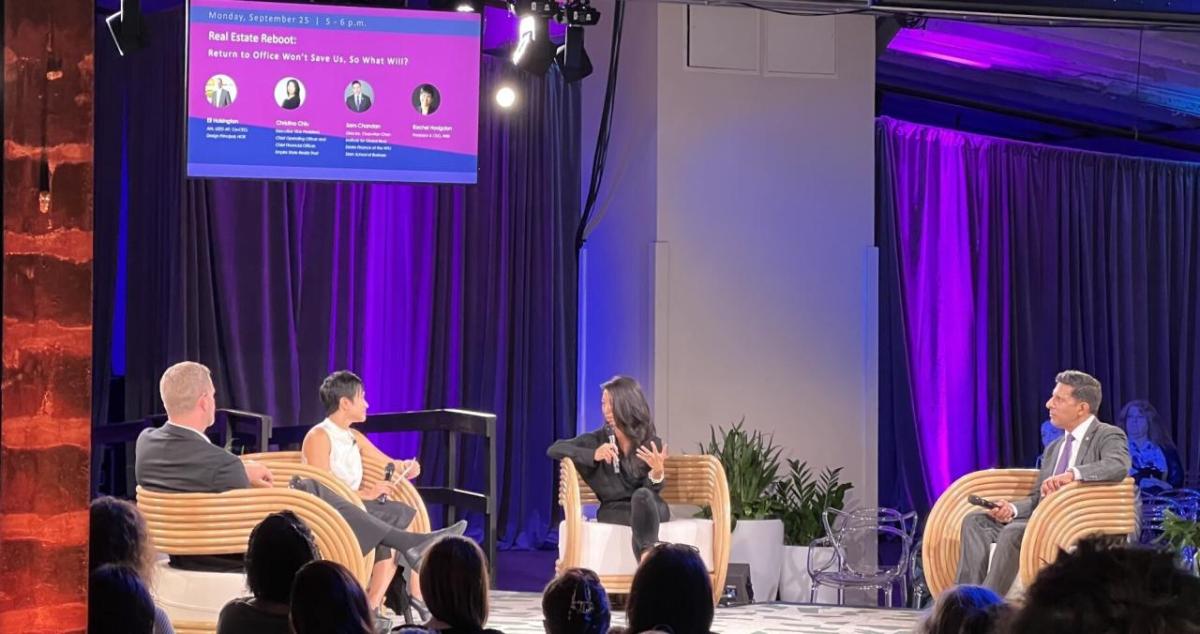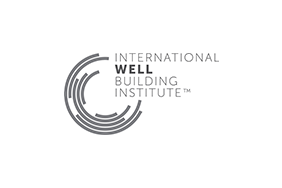WELL Summit 2023: Real Estate Reboot: Return to Office Won’t Save Us, So What Will?
Published 09-28-23
Submitted by International WELL Building Institute

In the face of volatile market dynamics – with ever-evolving workforce and place demands – how is real estate embracing change and driving innovation to reshape the future of work to support all workers?
Executives from HOK, Empire State Realty Trust and the NYU Stern School of Business joined International WELL Building Institute (IWBI) CEO Rachel Hodgdon on the WELL Summit 2023 MainStage for a compelling panel titled, “Real Estate Reboot: Return to Office Won’t Save Us, So What Will?”
A recent survey of office workers by Boston Consulting Group found that the vast majority of respondents – a whopping 85% – are working in some kind of hybrid scenario. At the same time, occupancy rates throughout the U.S. and around the world vary city by city and country by country, making it clear that “we are living through one of the biggest work experiments of all time,” Hodgdon noted.
After sharing a bit about each of their current hybrid work scenarios, panelists agreed that there is no one-size-fits-all solution, and that hybrid is here to stay...at least for the foreseeable future. Citing the Power of Proximity and their own experiences, panelists honed in on the key benefits of shared office time for employees.
Connectivity – a sense of community
Christina Chiu, EVP, chief operating officer and chief financial officer at Empire State Realty Trust, shared, “Employees want flexibility. It's a demonstration of trust. If you need the flexibility, I as an employer trust you as an employee to get it done and to utilize your days as needed, but every company has to find its own rhythm. It's not going to be one size fits all.” Chiu added that the side effect of that massive flexibility is people coming in on varied schedules, noting, “There's one thing worse than coming back before you're ready. It's coming back to an empty office.”
At the same time, Sam Chandan, founding director of the Chen Institute for Global Real Estate Finance at the NYU Stern School of Business, acknowledged the connectivity that virtual platforms can bring. “If you're in a smaller market, but you still want to be able to access that larger community of people, something like Zoom facilitates that in a way that would not have been possible 10 or 15 years ago, which may have left you feeling extraordinarily isolated.” He added, “It's not the same as being in the same room together, but anything that we can do to ensure that no one should ever have to feel alone – that is incredibly important.”
Collaboration – ideation and culture
Eli Hoisington, co-CEO at HOK, cited the benefits of social interaction to creative processes and to understanding and shaping company culture. Hoisington recalled a remark that has stuck with him, “A smoothie doesn't buy a culture,” and later noted that teams at HOK strive to understand the culture of the office that they’re designing for and then to reflect what those people need.
Commitment to people
“People come here [Empire State Realty Trust] because they're here to do their job, but they get more excited if they know that you as an employer are committed to their learning, their development and the potential to do more,” Chiu told attendees.
“You have to balance a lot of different considerations -- not least of which is making sure that we're leveraging the capacity for hybrid work to support folks that may have elder or childcare responsibilities,” indicates Chandan who also noted that “knowledge transfer and idea generation fundamentally happen more effectively when we are together in the room.”
Predictions for the future
- Hybrid work environments are here to stay. “There are roughly eight million unfilled positions in the U.S. That number exceeds the number of people that are looking for work,” Chandan noted. So, while the economy may be showing signs of cooling, companies that are seeking to fill the positions that require an incredible level of energy, dynamism and dedication will have to continue to compete for talent and provide workplace flexibility.
- Building and neighborhood amenities such as access to green space and transportation are increasingly important.
- “I think the power of humanity is going to override any other force. Our desire to be social beings will drive us to be in places together because that's where the best work happens.” -- Hoisington
- “I'm very optimistic about thoughtful real estate, whether that is thoughtful workspaces, thoughtful retail and other spaces.” -- Chiu
- “Folks who can think thoughtfully and creatively about how to unlock the value of space in a changed environment will see extraordinary success.” -- Chandan
Stay tuned for more highlights from the WELL Summit in Washington, D.C. For today’s schedule, please visit https://www.wellcertified.com/well-summit.
View original content here.

International WELL Building Institute
International WELL Building Institute
The International WELL Building Institute (IWBI) is a public benefit corporation and the world’s leading organization focused on deploying people-first places to advance a global culture of health. IWBI mobilizes its community through the administration of the WELL Building Standard (WELL Standard) and WELL ratings and certifications, management of the WELL AP credential, the pursuit of applicable research, the development of educational resources and advocacy for policies that promote health and well-being everywhere. More information on WELL can be found here.
IWBI is a participant of the United Nations Global Compact, the world’s largest corporate citizenship initiative, and helps companies advance the UN Sustainable Development Goals (SDGs) through the use of WELL.
More from International WELL Building Institute

